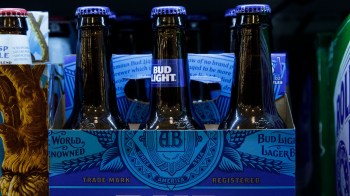Macrowikinomics: How collaboration is changing the world
TEXT OF INTERVIEW
STEVE CHIOTAKIS: Wiki is the Hawaiian word for “fast.” In its simplest form it means web collaboration. Don Tapscott co-wrote a book in 2007, “Wikonomics,” on how wikis were changing modern economics.
And now Tapscott has followed up with another book, called “Macrowikinomics,” which expands the focus and gives some examples of global innovation.
Don Tapscott is with us now. Welcome to Marketplace.
DON TAPSCOTT: Good morning.
CHIOTAKIS: Hey refresh us on the term “wiki.”
TAPSCOTT: “Wiki” is some software that enables a number of people to co-edit a document. But it’s become a metaphor for collaboration, and collaboration that can occur on an astronomical scale. So if you can create an encyclopedia with a million people that have never met, what else could you create? And it turns out you can create physical goods, like the Chinese motorcycle industry in a bunch of little companies; they cooperate and there’s no Harley Davidson pulling all the strings. This is now a third of all motorcycle production in the world.
CHIOTAKIS: Where does the “macro” part of wikinomics come into play?
TAPSCOTT: Wikinomics was about collaborative innovation. Macrowikinomics is about how collaboration is changing every institution in society. Many of the institutions that have served us well for decades are no longer able.
CHIOTAKIS: We know, Don, the Internet keeps proliferating across the planet. So what, if anything, could stop these types of ideas?
TAPSCOTT: I don’t think anything. In fact, the current recession is accelerating, the rate of change. It’s causing ad revenues for newspapers to decline so they need to look at new models. The pleading government coffered so the governments now need to fundamentally change. I think the cat is out of the bag.
CHIOTAKIS: Does the fact that more people, Don, are getting involved in these, as you say global collaborations, mean we’re going to — I don’t know — spread ourselves too thin or make ideas less interesting? Or even run out of monetary incentive?
TAPSCOTT: Well no. In fact everybody’s making money. The Wikipedia model is really an exception to the rule. But even in Wikipedia there is subtle commercial things going on. If I had someone who gives me a resume and they say, I’ve written 40 Wikipedia articles, that tells me a lot more than that they went to Harvard Business School. It’s a huge challenge for each of us to step up and don’t fight the future, but to embrace it.
CHIOTAKIS: Well the book is called “Macrowikinomics.” It’s a follow-up to the original “Wikinomics” book and Don Tapscott is the co-author. Don, thank you for joining us this morning.
TAPSCOTT: It’s my pleasure.
There’s a lot happening in the world. Through it all, Marketplace is here for you.
You rely on Marketplace to break down the world’s events and tell you how it affects you in a fact-based, approachable way. We rely on your financial support to keep making that possible.
Your donation today powers the independent journalism that you rely on. For just $5/month, you can help sustain Marketplace so we can keep reporting on the things that matter to you.


















